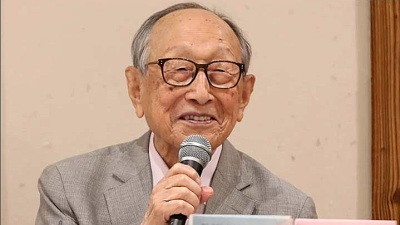
An older Korean person at your usual bus stop mumbles something that sounds almost like a question about the weather.
To be polite, you respond, only for them to glance at you and dismiss it casually with a shrug, saying, “Oh, I was just talking to myself.”
A 36-year-old American living in Seoul surnamed Rodriguez recalls encountering this situation upon first arriving here. Near him, an older Korean woman had murmured in Korean, “It’s so cold.”
Assuming she was speaking to him, he replied, “Not so much.”
Although self-talk is not unheard of elsewhere, recently, local media have taken an interest in the specific quirks of when and how Koreans most often do it.
On a tvN talk show, three students from overseas – Germany, Italy and Algeria – suggested certain aspects of this behaviour seem especially common in Korean society.
The Italian student even remarked, “People may think you’re a psycho,” for talking to yourself where he’s from.
Funny enough, the Koreans interviewed for this article were taken aback in equal measure to learn that talking to yourself, whether alone or in public, isn’t necessarily as common in some other societies as it is here.
“I never thought that doing this was peculiar,” said Park Jae-min, a 30-something office worker based in Seoul, when asked his thoughts about when people talk to themselves.
“It happens so naturally, usually without me even realising it.”
Strategic indirect communication
In general, self-directed speech is common in early childhood, typically between the ages of 2 and 6, as part of the cognitive development process, according to developmental psychologists such as Jean Piaget and Lev Vygotsky.
As children mature, this external speech gradually shifts to internal thought.
In adulthood, individuals may employ self-directed speech for practical purposes; for example, they might repeat the phrase, “You can do this,” when facing a challenging task.
Such self-directed statements can enhance focus, help with emotional regulation and improve cognitive performance, according to various psychological studies.
However, some Koreans seem to have internalised the habit of voicing their thoughts out loud, beyond merely purposeful self-affirmation or trying to improve their focus.
Examples include, to name a few: “Where did I put my phone?” “Oh, this is delicious. What’s in it?” “Is that so? I’m not so sure.”
For some, it may seem peculiar that someone would pose questions as if seeming to expect a response from others, even though they are not.
Song, 33, a Texas-based graduate student who has spent most of her life in the southwestern US, linked instances of indistinct speech to the use of filler words.
“I often hear Americans making brief interjections like ‘perfect’ or ‘great,’ but that’s about it,” she said, without specifying in which situations.
“It’s not super common,” she replied when asked generally if she’d heard anything akin to internal dialogues while living as a graduate student in Texas.
Choi Min-jae, 29, said he grew up listening to his grandmother frequently engage in monologues teetering somewhere between expressed inner thoughts and conversation with others.
“Whenever she said things like, ‘What should I eat so that a rumour starts that I ate so well?’ it was rarely directed at herself,” he said.
“Most of the time, she was asking me what I wanted.”
For some, monologues provide a less confrontational way to express frustration about situations or others.
Choi, a Seoul resident in her early 40s, frequently does this with her husband. She expresses her thoughts and feelings – often of discontent and disapproval – about him through self-directed speech when he is around.
“After more than seven years of marriage, my husband and I both use self-talk, rather than directing our frustrations at each other, as it can quickly escalate into arguments,” she said.
“Whenever he does something I don’t like – like eating late at night – I’ll just murmur to myself, ‘Doesn’t eating at this hour make (one’s) stomach feel heavy?’
Choi believes the Korean language’s null-subject structure, which allows the subject of a sentence to remain unexpressed, facilitates this indirect style of communication.
Han Min, an adjunct professor of psychology at Ajou University, echoed Choi’s sentiment that in these cases, acts of self-directed speech are on par with indirect communication.
In what he calls Korea’s high-context culture, subtle and indirect expressions are prevalent, he said.
“As is often the case in collectivist societies, Korean culture has maintained a closely-knit network of relationships,” he said.
“Self-talkers are mindful of potential interactions with those within hearing distance, and in this more context-dependent culture, it can function as implicit communication.”
Thus, self-talk as an indirect form of communication usually happens explicitly in front of people the self-talker already knows.
Observed more among older Korean people, the behaviour of humming melodically to oneself represents a way for individuals to express sentiments of joy or sadness either alone or when with someone else, Han noted.
Humming itself can be a form of expressing indirect communication in the sense that the hummer desires to convey subtly to others how they feel in that particular moment.
The Korean language itself, according to some studies, is well-suited for self-statements.
Korean language specialist Jeon Hu-min, in his article published in academic journal Hanminjok Emunhak in 2015, identifies a total of 25 sentence-ending auxiliaries used for self-talk, categorising them into two main types: descriptive and question-like.
To explain how self-talk is utilised in the realm of indirect communication, he presents a scenario where a student mutters to themselves, “It’s hot,” without using honorific auxiliaries.
The teacher still responds by asking if they should turn on the air conditioner.
Even though the speaker’s words were clearly directed at themselves, the hearer, by parsing the context, infers the student’s comment as an indirect request.
“It is a strategic move,” the article states, “although it is also possible to simply ignore it to reject the request.”
Outlet for ruminating
However, this passive mode of speech does not always imply an intention to communicate with others.
Some people just blurt out what’s on their minds in complete solitude.
Park shared that he talks to himself alone on many occasions. It varies from simple interjections and muttered sentences to more complex internal dialogues.
“In my interpretation, I sometimes do that to organise my thoughts,” Park said.
Experts view this talking habit through the lens of a coping mechanism.
A group of Korean psychiatrists on YouTube channel “Brainrich,” suggested that frequent monologues, even seemingly trivial ones asking oneself, “Why did I do that?” or saying, “I shouldn’t have done that,” could result from ruminating, the tendency to dwell on recurring negative thoughts and feelings.
The act of talking to oneself is referred to as “undoing,” according to the doctors, a defence mechanism to deal with regretful or shameful memories.
“When negative thoughts remain indigestible, even after being chewed over repeatedly, people (may) resort to talking to themselves,” said Heo Kyu-hyung, a medical specialist in neuropsychiatry.
Accustomed to hearing self-critical remarks is an interviewee from India in his 30s, who has lived in Korea for over a decade and wished to remain anonymous.
“Koreans seem to set high standards for themselves,” he said.
“When they fail to meet certain societal expectations, they tend to fall into a vicious cycle of self-blaming talk.”
Chung Chan-seung, a psychiatrist and director of the Social Responsibility Committee of the Korean Neuropsychiatric Association, explores the correlation between this talking behaviour and feelings of loneliness.
“As social beings, humans have an innate desire to communicate with others,” Chung said.
“When we feel secluded and alienated, we turn to ourselves for company.”
The rise in single-person households may be linked to feelings of loneliness and isolation in society.
According to April data from the Ministry of Interior and Safety, 41.8 per cent of the 24 million total households in South Korea consist of one individual.
Of course, loneliness is not solely determined by being physically alone.
“Even in the company of others, people can still feel lonely,” he said.
He endorses vocalising inner thoughts as a valuable emotional outlet.
As groups in Korea tend toward hierarchical organisation and collectivism, people here may feel they cannot easily say something directly to someone, so self-talk may fulfil an important missing role for both clarifying and subtly communicating one’s emotions.
“It can be a useful personal tool for processing thoughts, organising ideas, regulating emotions and relieving stress,” he continued, “unless it arises from serious mental conditions like schizophrenia.”
ADVERTISEMENT
ADVERTISEMENT








































